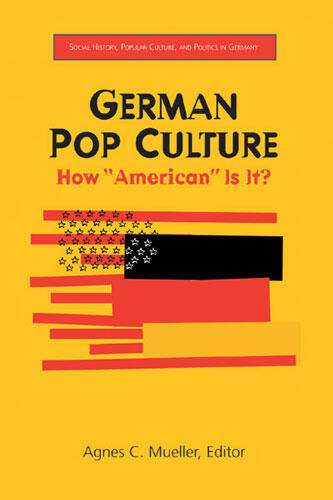German Pop Culture
How "American" Is It?
An incisive study of the impact of American culture on modern German society
Description
German Pop Culture sheds new light on the "Americanization" of German culture during the latter part of the 20th century, with special emphasis on post-Unification literature, music, and film. America and its iconography have been instrumental in defining German political and aesthetic culture, especially since World War II, and most recently in the aftermath of September 11.
Surrounding this indisputable phenomena, questions of the role and place of a "popular" German culture continue to trigger heated debate. Embraced by some as a welcome means to break out of the German monocultural mind-set, American-shaped "pop" culture is rejected by others as "polluting" established values, leveling necessary differentiation, and ultimately being driven by a capitalist consumer society rather than by moral or aesthetic standards.
This collaborative volume addresses a number of intriguing questions: What do Germans envisage when they speak of the "Americanization" of their literature and music? How do artists respond to today's media culture? What does this mean for the current political dimension of German-American relations? Can one speak meaningfully of an "Americanized" German culture? In addressing these and other questions, this work fills a gap in existing scholarship by investigating German popular culture from a multidisciplinary, international perspective.
Contributors to this volume:
Winfried Fluck, Gerd Gemünden, Lutz Koepnick, Barbara Kosta, Sara Lennox, Thomas Meinecke, Uta Poiger, Matthias Politycki, Thomas Saunders, Eckhard Schumacher, Marc Silberman, Frank Trommler, Sabine von Dirke
Agnes C. Mueller is Assistant Professor of German and Comparative Literature at the University of South Carolina.
Reviews
"Who's afraid of American culture? The essays assembled in Agnes Mueller's excellent reader provide provocative and often surprising responses to this particular German Angst. A fascinating and entertaining read, this volume shifts the terms of the debate on American 'cultural imperialism' from cultural paranoia to a more relational analysis of the ways Germans have used and appropriated American models for their own needs."
- Michael E. Geisler, Middlebury College
—Michael E. Geisler, Middlebury College
". . . fascinating, in-depth analyses of the American impact on German popular culture. . . . Highly recommended."
- M. Shafi, Univeristy of Delaware
—Choice
"This well-executed collection is a potent reminder that Germany's relationship with 'America' is, and always has been, for more complicated than we might think."
- Julia Sneeringer, Queens College and the Graduate Center CUNY
—H-Net Reviews in the Humanities & Social Sciences

